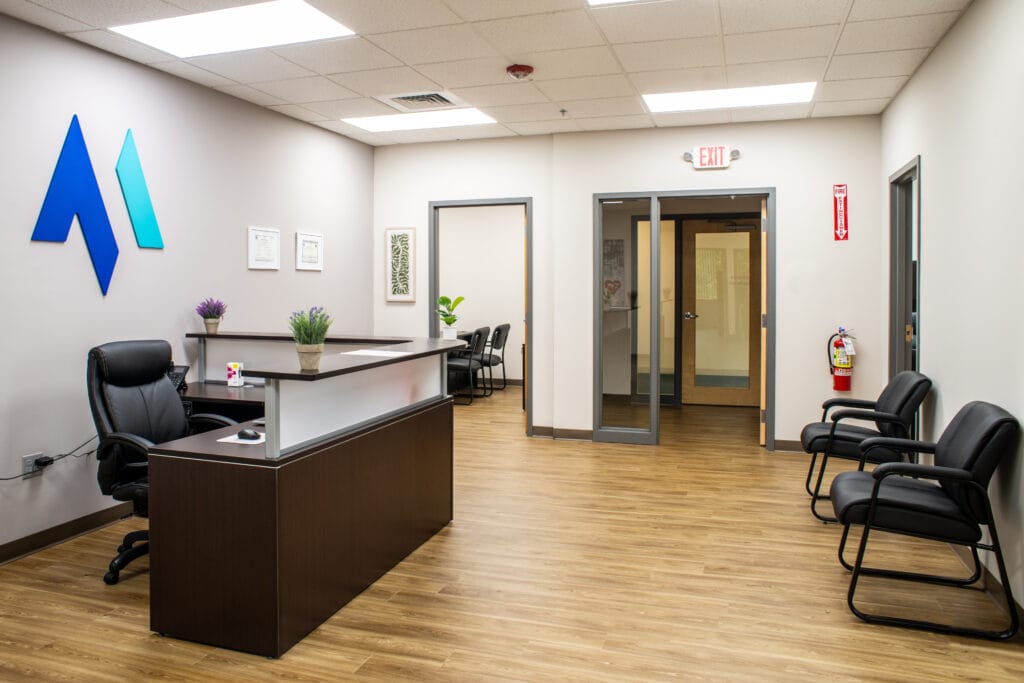Attention-Deficit/Hyperactivity Disorder (ADHD) is a neurodevelopmental condition that affects both children and adults, influencing various aspects of daily life—from academic and professional performance to personal relationships. At Meta Addiction Treatment, we provide individualized and comprehensive ADHD treatment for those living with ADHD, helping them manage their symptoms and reach their full potential.
Understanding ADHD
ADHD affects a person’s ability to concentrate, regulate impulses, and manage energy levels appropriately. While it typically begins in childhood, it often continues into adolescence and adulthood. Everyone occasionally struggles with focus or restlessness, but for individuals with ADHD, these challenges are persistent and can interfere with school, work, relationships, and everyday responsibilities.
Common symptoms include forgetfulness, disorganization, impulsivity, and excessive movement or talking. However, ADHD presents differently from person to person—some may primarily have difficulty paying attention, while others display more hyperactive or impulsive behavior. Symptoms can also change over time, particularly with the right support and coping strategies.
Types of ADHD
ADHD is categorized into three main presentations, based on which symptoms are most prominent:
Predominantly Inattentive Presentation: Individuals with this type often have trouble focusing, organizing tasks, following instructions, and remembering details. They may appear quiet or daydreamy and are easily distracted or forgetful.
Predominantly Hyperactive-Impulsive Presentation: This type is marked by excessive energy, restlessness, impulsivity, and difficulty staying still or waiting. People may interrupt others, speak out of turn, or act without considering the consequences.
Combined Presentation: The most common form, this type includes symptoms of both inattention and hyperactivity/impulsivity. Individuals may struggle simultaneously with focus, organization, and impulse control.
While ADHD affects people differently, many thrive with an accurate diagnosis, personalized treatment, and the right support system. Therapy, medication, and behavioral techniques can all help individuals with ADHD lead fulfilling and successful lives.
The Effects of ADHD

ADHD extends far beyond issues with focus. It influences how people process information, manage time, control impulses, and interact socially. The ripple effects of ADHD can impact physical health, emotional well-being, and relationships—making understanding these impacts crucial for providing effective support.
Physical Impact of ADHD
Though ADHD is a neurological condition, it often presents physically—especially due to excess energy and impulsivity. Individuals may fidget, tap, pace, or feel unable to sit still. In children, this can look like constant motion; in adults, it may feel like inner restlessness. Over time, this activity can lead to fatigue, particularly when paired with sleep difficulties—a common issue in ADHD caused by racing thoughts or irregular sleep habits.
Poor sleep can, in turn, negatively affect physical health, potentially leading to headaches, fluctuating weight, or a weakened immune system. Risk-taking behavior, such as reckless driving or experimenting with substances, may also result from impulsivity. Forgetfulness or disorganization can further contribute to inconsistent self-care, skipped meals, or missed medical appointments—affecting overall physical well-being.
Mental and Emotional Effects of ADHD
ADHD can take a significant toll on emotional and mental health. Many people with the condition feel frustrated when they can't follow through on their intentions, like forgetting tasks or missing deadlines. These ongoing challenges can lead to stress, low self-esteem, and a sense of inadequacy. Unfortunately, others may misinterpret ADHD symptoms as laziness or lack of motivation, especially when undiagnosed or untreated.
Emotional regulation is another common challenge. Individuals may experience intense emotions, rapid mood changes, or difficulty calming down after becoming upset. These patterns can contribute to anxiety, depression, and chronic stress. Trying to manage daily life without the right tools or understanding can be exhausting, making emotional support and self-awareness essential components of treatment.
How ADHD Affects Social Life and Social Relationships
ADHD also affects how people relate to others. Impulsivity may cause someone to interrupt conversations, speak without thinking, or act in socially inappropriate ways, which can strain relationships. Difficulties with attention or follow-through might be perceived as disinterest or irresponsibility, leading to misunderstandings in both personal and professional settings.
In group environments like school or work, individuals with ADHD may feel different or excluded due to their communication style, behavior, or workflow. Social rejection or criticism—especially in childhood—can damage self-confidence and make building trust more difficult. However, with proper treatment and a supportive environment, people with ADHD can develop stronger interpersonal skills and create meaningful, lasting connections.
Signs of ADHD
ADHD can manifest in a variety of ways, and its symptoms often fall into three main categories: physical, behavioral, and psychological. Understanding these signs can help individuals, caregivers, and professionals identify the condition early and seek appropriate support.
Physical Signs of ADHD
Though ADHD is a neurological disorder, it often shows up in physical ways, especially due to hyperactivity and restlessness. These signs are more noticeable in children but can persist into adulthood.
Fidgeting or squirming frequently
Difficulty sitting still for long periods
Restless movements (e.g., tapping feet, drumming fingers, pacing)
Excessive talking or loudness
Trouble sleeping or irregular sleep patterns
Seeming constantly “on the go” or driven by a motor
Frequent physical accidents or clumsiness
Behavioral Signs of ADHD
Behavioral symptoms often affect daily functioning, organization, and the ability to follow rules or routines. These patterns may be observed at home, school, or work.
Difficulty following instructions
Frequently interrupting conversations or activities
Trouble waiting their turn or staying in line
Impulsive decision-making
Forgetting or losing things regularly (e.g., homework, keys)
Poor time management or procrastination
Starting tasks but rarely finishing them
Psychological Signs of ADHD
ADHD also impacts how a person thinks, feels, and copes emotionally. These psychological signs may not always be obvious but can deeply affect mental health and self-esteem.
Easily frustrated or emotionally reactive
Racing thoughts or feeling mentally overwhelmed
Trouble focusing or maintaining attention
Chronic stress or anxiety, especially about performance
Low self-esteem or feelings of inadequacy
Mood swings or difficulty regulating emotions
Feeling mentally "scattered" or disorganized
How to Treat ADHD

ADHD is a highly manageable condition, and with the right combination of treatments and support, many individuals not only cope but thrive. Successful treatment typically involves a personalized mix of therapy, medication, lifestyle changes, and a strong support network—tailored to meet each person’s unique needs and goals.
Therapy and Counseling
Therapy can help individuals better understand their ADHD, develop coping strategies, and improve emotional regulation. Behavioral interventions are particularly effective in promoting structure and reducing impulsivity.
Cognitive-Behavioral Therapy (CBT): Helps manage time, reduce procrastination, and shift negative thinking patterns.
Behavioral Therapy: Commonly used with children to reinforce positive behaviors through structured rewards and consequences.
ADHD Coaching or Skills Training: Focuses on practical tools like organization, planning, and time management.
Family Therapy: Supports families in understanding ADHD and fostering a more encouraging, unified environment.
Social Skills Training: Builds communication and interaction skills, especially helpful for children and teens.
Medication
For many, medication plays a key role in managing ADHD symptoms. It can enhance focus, impulse control, and overall daily functioning.
Stimulants: Medications like methylphenidate (Ritalin, Concerta) or amphetamines (Adderall, Vyvanse) are commonly prescribed and highly effective.
Non-Stimulants: Options like atomoxetine (Strattera) or guanfacine (Intuniv) may be used if stimulants are not suitable.
Ongoing Medication Management: Regular check-ins with a healthcare provider ensure dosages are effective and side effects are monitored.
Lifestyle Changes and Self-Care
Daily habits and routines can significantly influence how ADHD symptoms are managed. Structure, consistency, and mindfulness make a big difference.
Regular Physical Activity: Helps reduce restlessness and improve focus and mood.
Consistent Sleep Schedule: Supports attention, energy, and emotional stability.
Balanced Nutrition: A healthy diet with limited processed foods can promote steadier energy levels and focus.
Time Management Tools: Planners, alarms, and apps can aid in staying on task and organized.
Mindfulness Practices: Meditation and breathing techniques help enhance attention and reduce stress.
Support Systems and Community Resources
Having a strong support system is essential. Encouragement and understanding from others can ease the daily challenges of ADHD.
Family and Friends: Informed loved ones can provide meaningful emotional and practical support.
Support Groups: Connecting with others who share similar experiences offers comfort, advice, and community.
School and Workplace Accommodations: Modifications like extended time, quiet spaces, or flexible deadlines can be incredibly helpful.
Educational Support: Academic coaches or tutors can offer guidance with learning and organization.
Alternative and Holistic Therapies
Complementary therapies may enhance traditional ADHD treatment by promoting overall wellness and mind-body balance.
Neurofeedback: A brain-training method aimed at improving attention and self-regulation.
Yoga and Movement Therapy: Supports physical awareness and emotional regulation.
Art and Music Therapy: Creative outlets that help with focus and emotional expression.
Omega-3 Supplements: Some research suggests these may benefit brain health and attention.
Herbal Remedies: Should always be used under medical supervision to avoid interactions with prescribed medications.
With consistent care and the right approach, individuals with ADHD can build confidence, develop healthy routines, and succeed academically, professionally, and personally. The key lies in finding a treatment plan that works for their unique journey.
Get ADHD Treatment in Massachusetts

If you or a loved one needs help with mental health, call us today at 844-909-2560, or email us at info@metaaddictiontreatment.com. You can also visit any one of our three locations, which are open 24/7:
- ADHD treatment in Marlborough, MA
- ADHD treatment in North Reading, MA
- ADHD treatment in Haverhill, MA
At Meta, we are committed to providing comprehensive ADHD treatment solutions that empower individuals to overcome the challenges of ADHD and thrive in all aspects of their lives. From evidence-based therapies to medication management, behavioral interventions, and ongoing support, our holistic approach addresses the unique needs of each individual on their journey towards lasting relief from ADHD.
If you or a loved one is struggling with ADHD, don't hesitate to reach out–contact us today to learn more about our ADHD treatment programs and take the first step towards a brighter, more focused future.



